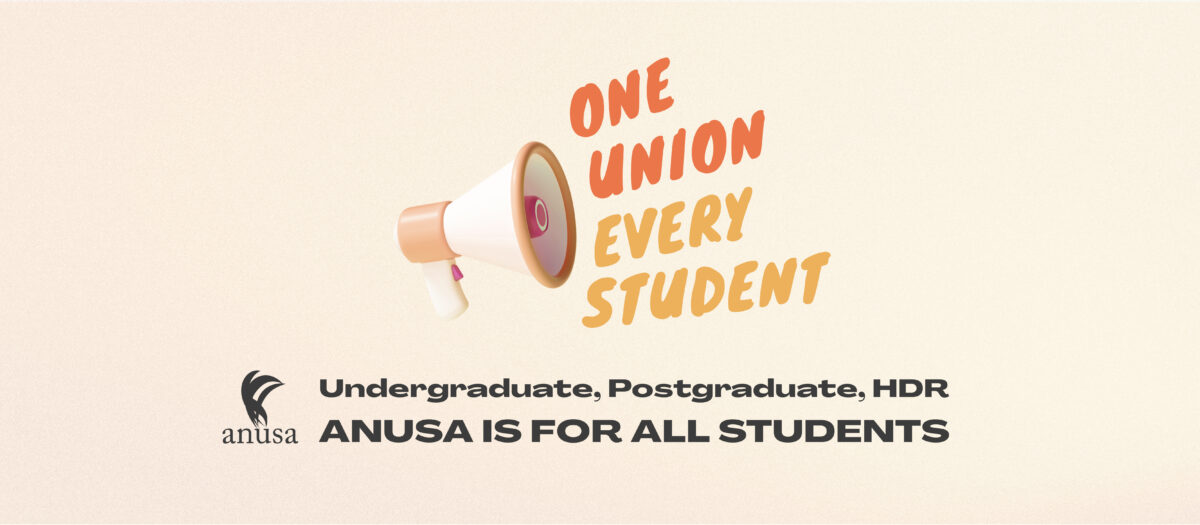The ANU has given the ANU Students’ Association (ANUSA) the final approval to assume the postgraduate services that the now-defunct Postgraduate and Research Students’ Association (PARSA) previously offered. This approval includes funding arrangements and an interim and long-term governance structure for the now sole student union on campus.
Previously, both PARSA and ANUSA claimed around a third each of the Student Services and Amenities Fee (SSAF) funding pool. Now, however, ANUSA will receive around 60% of the total pool, obtaining most of PARSA’s budget. The remainder will go back into the SSAF pool for student organisations and some ANU teams to bid for. Woroni understands that the remaining 2% of the SSAF pool not transferred to ANUSA accounts for cheaper operating costs now that ANUSA and PARSA can share services and subscriptions.
Much of the new money will go towards current programs, such as Shut Up and Study, and the Student Extracurricular Enrichment Fund (SEEF). They will also help to fund student assistance programs and ANUSA’s legal services, which postgraduates have had access to for a while now.
ANUSA’s autonomous Departments will also see increased funding, helping to compensate for overworked and underpaid Department Officers. A $20,000 commitment to the National Union of Students will be the one of the largest upticks in cost not directly related to postgraduate services, after an OGM passed the motion last year. Overall, most of ANUSA’s operations have seen a funding increase to cater for the new members.
The Student Assistance Team – who deliver financial assistance and other advice to students – will see its budget increase from $80,000 to $200,000. The team currently deals with both undergraduates and postgraduates, and ANUSA has consistently argued it is stretched thin. It was also a major source of a temporary $400,000 budget deficit last year.
ANUSA President Ben Yates promises uninterrupted service provision for postgraduates, and is confident in ANUSA’s ability to handle the workload.
However, some students, especially postgraduates, may worry about the future of postgraduate representation. According to a constitutional amendment last year, ANUSA will have interim postgraduate representatives before moving to a more integrated model in this year’s elections.
From the 30th of June until the 1st of December there will be specific positions for postgraduates. After that, postgraduates will compete against undergraduates for general representative positions, and for positions on the executive, such as President, Vice-President and Treasurer. On the College Representatives Council there will be 12 undergraduates and 14 postgraduates (7 for coursework and 7 for research).
Having postgraduates and undergraduates compete against each other in elections creates a more streamlined system, but it may put postgraduates at a disadvantage. They tend to work full time, have a more intense workload, or may also be raising families.
ANUSA will create three new positions, a Postgraduate Coursework Office, a Higher Degree by Research Officer and an Undergraduate Coursework Officer, to sit on the new Academic Management Committee, replacing the College Representatives Council.
Yates claimed that the proposed model of postgraduate representatives fully integrated into the Student Representatives Council and the new Academic Management Committee received overwhelming support from postgraduates during consultations.
The changes mean that ANUSA will have a much larger budget to provide services to students, and will be able to include, and advocate for, all students on campus. It strengthens ANUSA’s position on campus, as current President Yates, and former President Christian Flynn have both argued.
In a comment to Woroni, Yates claimed that “we [ANUSA] have consistently heard support for ANUSA to take on postgraduate services and representation” adding that the new changes make ANUSA “an authentic representative organisation for all ANU students.” Yates believes this will give “postgraduate students the benefit of ANUSA’s long institutional stability and history of advocacy and activism.”.
The ANU decided to stop funding PARSA halfway through last year following issues of financial mismanagement, limited service delivery and the mass resignation of the PARSA Board. PARSA, ANUSA and the University have been working together to establish a new model for postgraduate services. However, with no feasible model in sight, ANUSA moved last year to assume representation of all postgraduate students. ANU’s approval means it now acknowledges ANUSA’s new role.
There will be a review later this year, but Yates told Woroni that ANUSA is confident they will meet such targets.
Riddled with governance difficulties and infighting, PARSA has not been an activist organisation on campus in the last few years, while ANUSA has continued to push against many University decisions. Postgraduate unions tend to have less involvement than undergraduate ones, reflecting the workload of postgraduates, and the fact that many work for the ANU and hence are also part of the National Tertiary Education Union (NTEU). Nonetheless, in representing all student voices on campus, ANUSA will likely engage the ANU on a stronger footing.
The new funding and governance arrangements will come into effect on the 30th of June this year.
It remains unclear how including postgraduates will shape ANUSA’s future direction, and how successful the inclusion will be. However, it does promise a more contested election later this year, with all positions open to all students.
Disclosure: Woroni is a SSAF-funded organisation as well, and sits on the SEEF Grants Panel.
We acknowledge the Ngunnawal and Ngambri people, who are the Traditional Custodians of the land on which Woroni, Woroni Radio and Woroni TV are created, edited, published, printed and distributed. We pay our respects to Elders past and present. We acknowledge that the name Woroni was taken from the Wadi Wadi Nation without permission, and we are striving to do better for future reconciliation.
